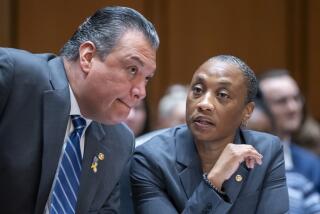New Farm Plan Expected; Meese Vote is Still Blocked
WASHINGTON — Angry Senate Democrats rejected a Reagan Administration-approved farm credit relief package Thursday night, saying that they would continue to block a vote on the nomination of Atty. Gen.-designate Edwin Meese III until farmers get more help.
The unanimous action by the Democrats in closed caucus was taken only hours after a bipartisan group of senators had reached tentative agreement with reluctant Administration officials on the proposed relief measures.
Immediately after the Democrats’ rejection, Senate Majority Leader Robert J. Dole (R-Kan.) reconvened negotiations involving key Republican and Democratic senators. He suggested that he would keep the Senate in session late into the night and through Saturday in an effort to wear down the filibusterers.
The filibuster, launched Wednesday, has prevented any vote on Meese’s nomination to replace William French Smith as attorney general. That vote had been expected to result in Meese’s easy confirmation.
“We’ve got until March 15” before farmers need money to get crops planted, said Dole, who is facing the first crisis in his new leadership post. “Every day we waste up here is another day that farmers do not get relief.”
At his news conference Thursday evening, President Reagan acknowledged that “the farmers have a very real problem” and said that “we’re going to do our utmost to help them find a solution to it.”
The series of administrative measures to which Agriculture Secretary John R. Block had agreed--later endorsed by Reagan--were aimed mainly at making more bank loans available to thousands of debt-ridden farmers caught in one of the worst economic crises ever to hit the Farm Belt.
Democratic senators protested in caucus that more aid is needed. They primarily want a guarantee of Senate action on a bill approved Thursday by the House Appropriations Committee that would allow farmers to get immediate advances on loans that are usually made only after crops are harvested.
But the Democrats got really angry, Sen. Alan Cranston (D-Calif.) said, when they were read an “insulting” letter sent by Block to Senate Agriculture Committee Chairman Jesse Helms (R-N.C.).
Cranston said Democrats were infuriated because the Administration, which had grudgingly agreed to more farm relief only in the face of the Democratic filibuster, took full credit for the aid package and because Block said the Administration “would oppose any additional legislation” because it “would harm farmers by delaying implementation of our programs.”
‘Slap in the Face’
Democrats also insisted that Reagan sign the letter agreeing to the relief package and that he direct all officials, including Budget Director David A. Stockman, to carry out the measures. The senators said they feared that Stockman, a sharp critic of farm assistance programs, would thwart Block’s efforts to provide credit relief.
“The letter was a slap in the face,” Sen. Tom Harkin (D-Iowa) said.
At his news conference, Reagan attributed the farm crisis to the inflationary economy of past years and to failed government programs. “We won’t pull the rug out from anyone instantly who has geared themselves to . . . government programs,” he said. “But the government programs didn’t succeed.”
The great majority of farmers, he added, “believe the answer to their problems is out in the free market. If government is to help, then we should help by opening up world markets for them.”
‘Regret’ by Stockman
He also said he believes that Stockman should keep his job, saying that the budget director has “expressed some regret” and that “I could understand a fellow blowing his cool” under lengthy, intense congressional questioning.
Sens. David L. Boren (D-Okla.) and J. James Exon (D-Neb.), who organized the filibuster and helped negotiate the relief package, said they agree with the caucus’ decision to reject it because the Block letter foreclosed consideration of other legislation.
The rejected package contained these measures:
--An agreement by Block to ease regulations that were deterring many private banks from offering farmers federally guaranteed loans that they badly need to restructure their debts.
Differences in Loans
The government now will guarantee a private loan against default only if the bank reduces the interest rate enough to enable a farmer to make an estimated 10% profit. The new regulation would require only that the farmer be expected to break even.
This would enable the banks to charge higher interest and thus encourage them to make more guaranteed loans. The eligibility requirement would not be relaxed for loans made directly by the Farmers Home Administration--and this upset many Democrats.
--An agreement by Block to support more funds for federal loan guarantees and for loans made directly by the Farmers Home Administration. The House Appropriations Committee wants to add $1 billion to the existing $650-million loan guarantee program.
--An agreement by Block to permit a greater percentage of private loans to be guaranteed by the government. This would raise the effective guarantee from as low as 65% to as high as 90%.
More to Read
Get the L.A. Times Politics newsletter
Deeply reported insights into legislation, politics and policy from Sacramento, Washington and beyond. In your inbox three times per week.
You may occasionally receive promotional content from the Los Angeles Times.










